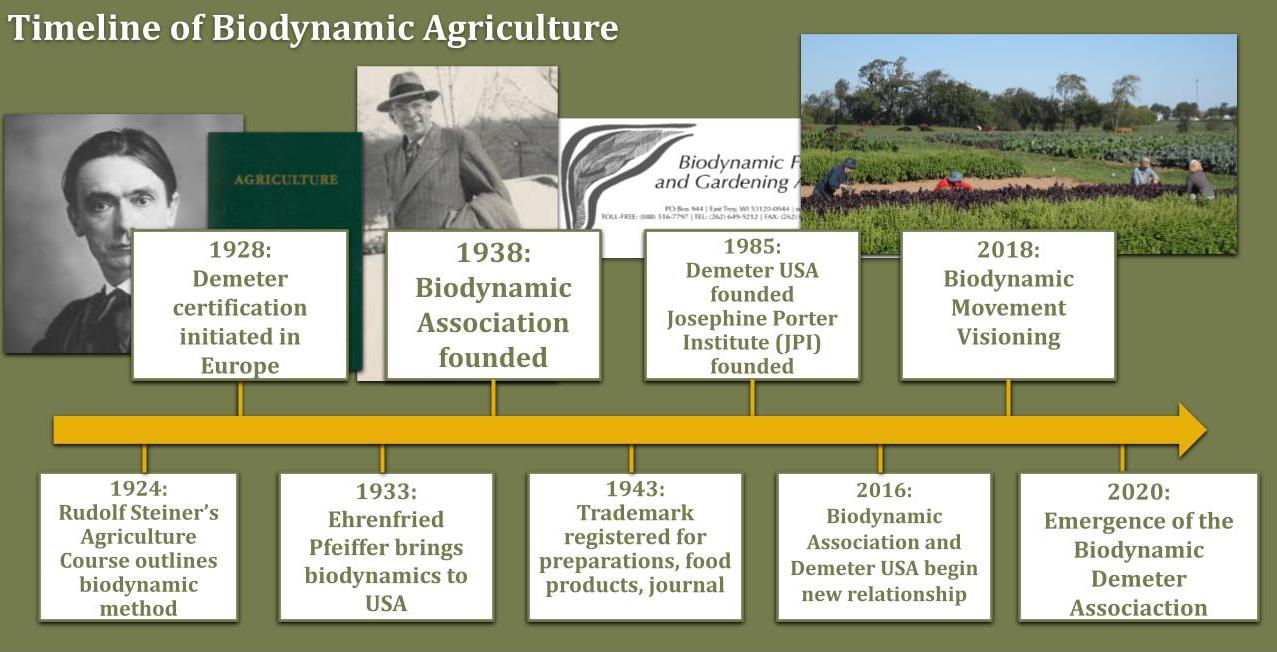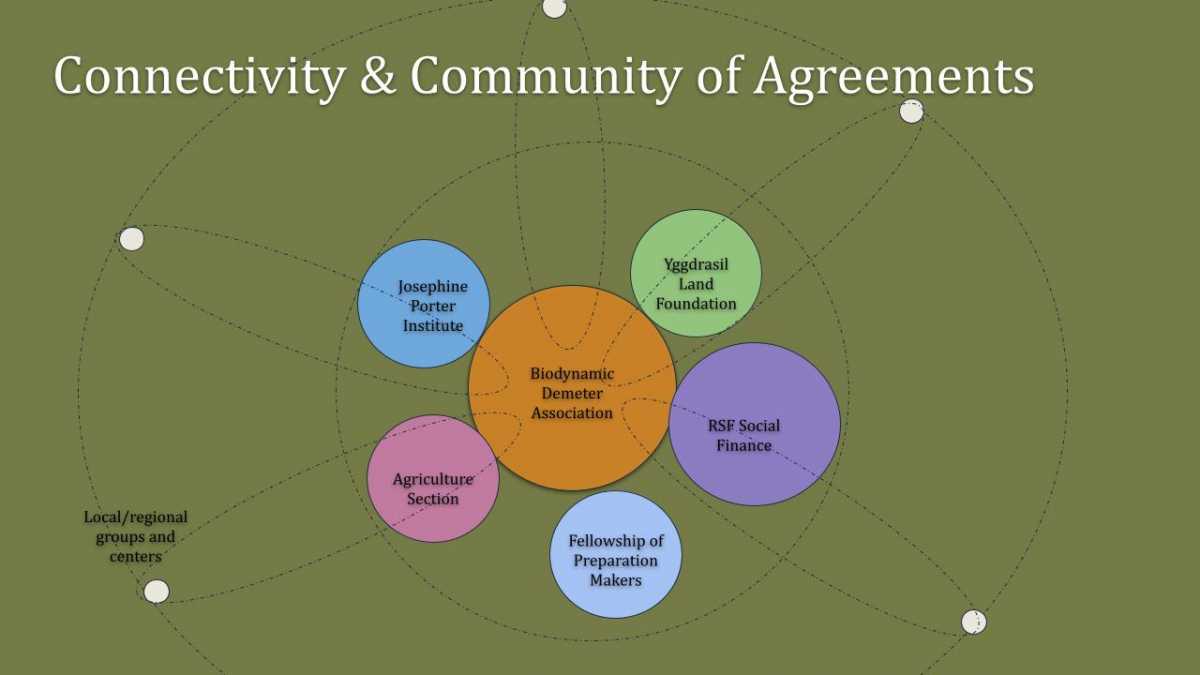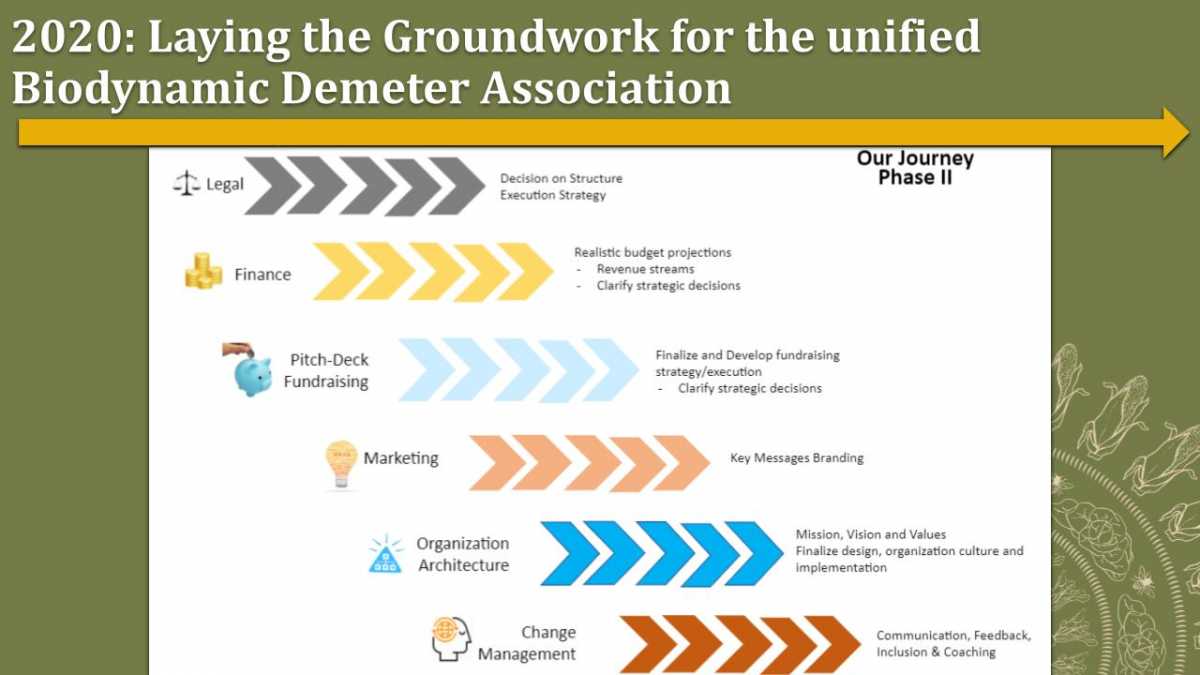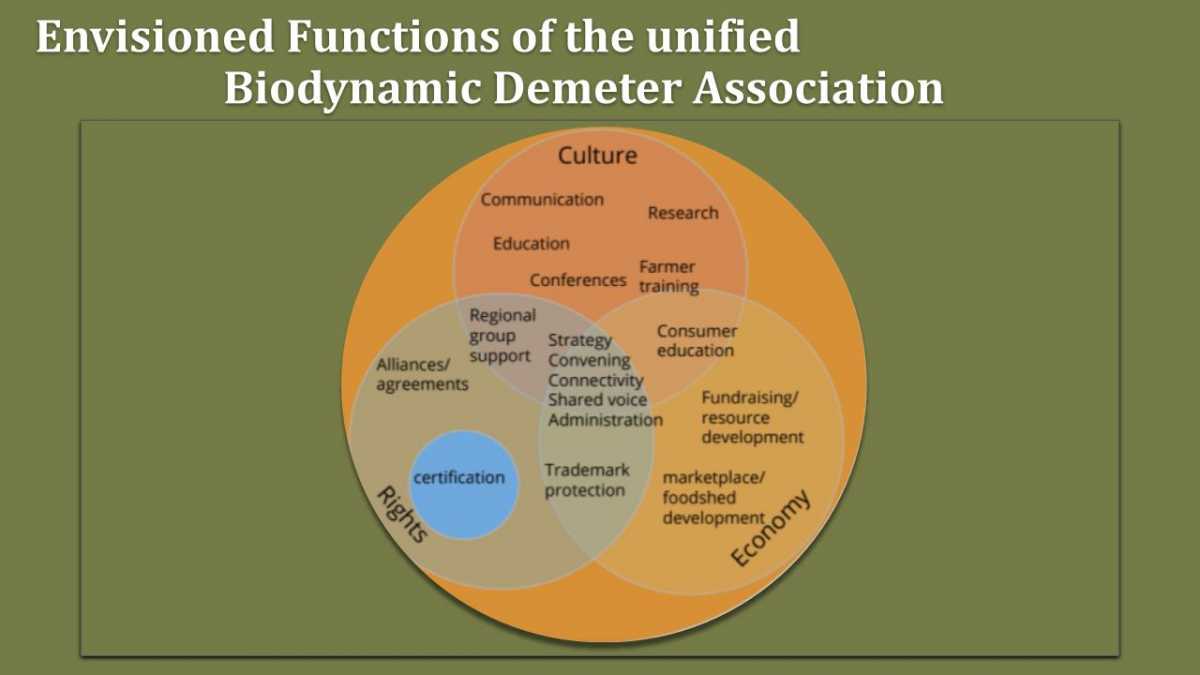
By the Unification Nucleus Group (Osiris Abrego Plata, Daphne Amory, Rebecca Briggs, David Byrnes, Rudy Marchesi, and Tonya Taylor)
As we begin the new year, we are excited to be witnessing and participating in the cocreation of a new entity that has been long in the making—97 years after Rudolf Steiner gave the Agriculture Course in Koberwitz, 83 years after the founding of the Biodynamic Association in the US, and 36 years after the founding of Demeter USA and the Josephine Porter Institute. Beginning in 2016 with initial visioning work, the BDA, Demeter, and key stakeholders began to talk about how to work together more collaboratively and understand what is living in the biodynamic movement at this time. From that foundation, the formation of the Council of Biodynamic Organizations (CBO) in 2019 opened the door to reimagining what a healthy, associative, collaborative, integrated, transparent, accountable, and functional ecosystem of biodynamic organizations in the US would look like. And, finally, the approval by the Biodynamic Association (BDA) and Demeter boards this past spring to bring the two organizations into new relationship with each other and the biodynamic community, based on a proposal by the CBO, initiated a process that we are now beginning to see come to fruition.
The vision we are working toward is no less than a reimagining of agriculture: a cocreative, equitable, thriving biodynamic ethos permeating throughout regenerative farming systems and practices, contributing to a resilient food system and honoring humanity’s intrinsic appreciation of diverse and inclusive connections to earth and spirit. Toward this end, we are viewing the organization from a threefold perspective (culture, rights, and economy) based on Rudolf Steiner’s anthroposophical insights. We are striving to ensure that each sphere is well held and that they are all integrated with each other. With the BDA and Demeter coming together to form a central hub that is interconnected with all the regional and local groups and centers across the country, we envision mutual communication, connection, and support to further the goals of the holistic biodynamic ecosystem. We also are committed to strengthening the economic sphere, which has not been held strongly by any biodynamic organization in the US for a number of years. Finally, the whole of this work is founded upon and informed by principles of social justice and diversity, equity, and inclusion.

During the summer of 2020, we engaged the consulting team of Eller Executive Education (EEE) to help us work toward this inspiring but complex vision. EEE structured the work into three phases. During Phase 1, they helped us and community stakeholders to develop a stakeholder map to envision the evolution of the movement using a collaborative framework; refine a proposal for a sustainable business model that takes into account “people, planet, and profit”; and identify the readiness for change both within our organizations and in the broader movement. In the fall, in Phase 2, we took further steps to lay the groundwork for unifying the organizations as we dug more deeply into legal, financial, fundraising, marketing, organizational architecture, and change management aspects.

During the Online Biodynamic Conference in November, we shared updates on our progress and met with interested community members during an open space salon session. During this session, attendees placed emphasis on:
To these important objectives, we also hope to expand the awareness of the value of biodynamic farming and the Demeter standard by:
Now we begin to look toward Phase 3: with blueprints in hand from the prior phases, we can turn to building the actual structure. We see the community’s support and feedback in this process as crucial to the new organization’s success as a hub for connections and partnerships. As we engage with these next steps, we will keep you informed on a regular basis, and we humbly ask that you, as community members, connect with us to let us know your ideas, perspectives, and questions. We look forward to hearing from you as we consider these key questions for this new vision that we build together. There are many decisions yet to be made and much input to be gathered from staff, board, and community members, but we are now at the stage where we can more clearly see the reality of the CBO’s vision taking shape. This part of the process will take some time, as we value proceeding thoughtfully and deliberately—yet courageously. We are immensely appreciative of all the individuals who have participated in so many ways throughout this process, as well as those of you who we hope will share your feedback with us in the coming months. There is much to determine and much that is not yet known. Nonetheless, we recognize this uncertainty as crucial to the process, to being truly open to the creative inspiration of what may be possible. We are working toward an organization that serves all biodynamic land stewards, regardless of the scale or type of your stewardship, where you live, whether you are experienced or new to biodynamics, or whether you participate in the marketplace. Together we can shepherd a cohesive inclusive national organization in support of biodynamic agriculture and the growth of the biodynamic movement. We invite you to reach out to us by emailing info@biodynamics.com so it can be forwarded on to the Nucleus Group. (If you previously tried to email us at nucleus@biodynamics.com, we apologize for the issue with that address and invite you to contact us at this revised email.) The group consists of representatives of Demeter and BDA boards and staff who manage and support the unification process, communication, and overall support to boards and staff. The current members are Osiris Abrego Plata, Daphne Amory, Rebecca Briggs, David Byrnes, Rudy Marchesi, and Tonya Taylor. For more information about the history and process of this work, please see the BDA & Demeter USA Unification Q&As and "Biodynamic Association and Demeter USA Will Unify to Nurture the Future of Biodynamics", “Aligning and Integrating the Work of the Biodynamic Movement in the US", and “Visioning the Future of Biodynamics” on this blog. |


Añadir nuevo comentario